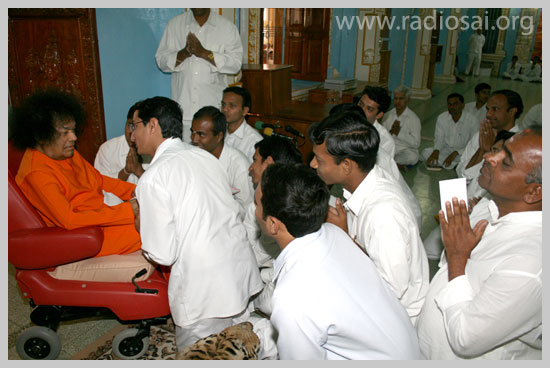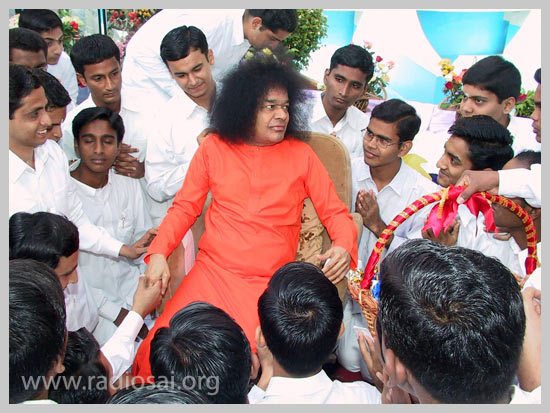|
|
Home >> Swami & Me Article |
| Follow us: |
Posted on : Feb 15, 2012
“HE IS GOD! I JUST KNEW IT!”
- a conversation with Vinod Cartic, an alumnus of SSSIHL
Listen to the Radio Programme
Part - 2
Grama Seva – Great Experiential Learning
RS: Did any of the hostel activities deeply impact you?
VC: Grama Seva made a deep impact on me. Let me draw a parallel - if I were to learn swimming, I could always go to a coach and he would instruct me to take my hands up 30 degree, and move my feet by 40 degree. The rhythm could all be technically acquired and yet we wouldn’t know anything when we jump into the pool. So they say, the best way to learn swimming is to simply jump into the pool! And, I think that’s precisely what Swami has done through Grama Seva. As much as it is a revelation about social concern, it is also a lesson for those who are educated to devote their time to the well-being of the society. More importantly, it is a huge lesson in management especially for some of us management students.
RS: This is interesting, could you elaborate?
 |
 |
 |
 |
 |
 |
 |
 |
| The Grama Seva is an exercise which apart from giving the students an opportunity to test their planning and management skills, also sensitises them to the plight of the rural folk. |
|||||||
VC: Some of the management lessons focus on what supply-chain management is all about, how you go about production planning, and even about how you market yourself and so on. Grama Seva teaches all of this and more – with utmost simplicity – and not only do you touch the homes of people but even their lives, their very hearts. The Grama Seva initiative is certainly very close to my heart.
RS: If you look at the Grama Seva in its entirety, more than the actual act of offering the villages a food packet or clothes, I think like any seva initiative, what it does to the person who is doing the Seva is more important. And that is what we see here - the students, when they come back, the experience that they have had of being a part of it, their view of life that they slowly imbibe - I think all of that make a huge impact.
VC: True. Swami as a visionary in education has always stood apart. Interestingly, the values that Swami spoke about as early as 1981 are being discussed in other institutions today. And, there are some organisations that are only now starting to think about rural initiatives that again were introduced at Prashanti Nilayam long ago.
RS: Yes, Swami started the rural development programme nearly 10 years ago!
 |
 |
 |
 |
 |
 |
 |
 |
| True education is that which develops in you love for your fellow-beings and motivates you to serve the community. - Baba | |||||||
VC: We also have the course - National Perspectives on Rural Development. And all of these have given a very holistic approach to life. As Swami says, “Education is for life; not just for living.” And so, to reiterate that one singular learning that I took away from Swami’s University – it is about spirituality being an integral part of life. You don’t have to go to the temple to express your spirituality because spirituality in itself is life.
Insightful Interactions with Sadguru
RS: Coming back to the time that you spent with the Lord, the moments of interaction, when you clarified many things directly from the Divine. Could you go back to your MBA days and recollect such moments for us?
VC: I remember, at one time, Swami had blessed us with a family interview. Right at the beginning of the conversation, Swami asked me: “Who is your Guru?” Needless to say, I had read a lot about such topics even before coming here, and I have always felt: “Swami is God; He is my Guru”. When I said so, Swami replied: “The only Guru is God”. Probably I was a good student or whatever, I just said: “Swami, You are my God, You are my Guru.” And Swami immediately stopped me and said: “There is only one Guru and that is within you - that is the Conscience.”
When I look back and recall the various times prior to that meeting and thereafter, I have realized that it is the inner Guru who manifests at different times and in different forms outside. There could be instances when even a small child teaches you something – perhaps something that you already know but the child’s words serve as a reminder. And that I think is the role of the Guru. If all of us could only connect to this inner prompter or this conscience, life would be so much simpler.
RS: “Follow the Master.” That’s what Swami would always say. That Master is within you!
 |
 |
 |
 |
 |
 |
 |
 |
| During his student days and the following years that Vinod spent in Prasanthi Nilayam, he was blessed to interact with Bhagawan on numerous occasions | |||||||
VC: He is within us, absolutely! There are innumerable occasions when the conscience actually tells you so. A question I used to ask myself and often featured in the discussions that I had with the others was about how to figure out that the voice within is the voice of the conscience or the voice of the mind? I have come to believe that when it is the voice of the conscience, you just know it is so.
Following the Master Diligently
RS: Have there been instances where you had certain dilemmas and just followed your conscience?
VC: There have been times when out of ignorance of Swami’s work, people have shared mixed opinions about Him. I have always been open to listening and understood their doubts simply because not everyone knows about Swami, not everyone has seen Him - so you need to accommodate their views as well. And yet, I remained steadfast in my belief that Swami is God simply by listening to the voice of my conscience.
Earlier, I would often be assailed by the question – “If I believe that Swami is God, am I doing what is in line with my belief?” And each time my conscience would say, “If that is so, you should be going back to what your childhood tells you: ‘God is on earth, what are you doing elsewhere?”
So, I am convinced that even the decision to join Swami’s University was a straight and clear dictate from the conscience - “God is on this earth. Just go and spend time with Him!”
 |
|
| Bhagawan speaking with Mr. Vinod Cartic and few other alumni of the university in the Bhajan Hall |
RS: And then later in your life, after your stay at Swami’s University, was there any instance in your life when you just didn’t think twice about taking a particular decision?
VC: Soon after I finished my MBA, I was confronted with a dilemma about whether to take up a job or study further. I tried looking for clarity but often ended up confused. Let’s not forget that we also have the concept of 'waiting' here at Prashanti Nilayam.
RS: Just to make it clear to our readers – ‘waiting’ is the period when students wait for Bhagawan to give directions soon after their period of study is over at His institution. Swami’s instruction could come sometimes in one day or take up to one year or even five years.
And you were into that kind of a situation where you decided that you would wait for Swami’s instructions soon after your finished his post-graduation.
VC: Even during my student days, I used to be a little closed to the idea of waiting. Somewhere at the back of my mind, I would think that ‘waiting’ is another excuse for laziness or prevaricating. Fortunately, the Master prompted me from within to stay on at Prashanti Nilayam. These have been the most fortunate years of my life because I have lived up to what I believe in. I have come here because God is on earth – to spend time with Him. The learning that you can get by just being in Prashanti, observing Swami, listening to what He says – that learning is so complete and all-encompassing that I probably would never have absorbed even half as much after perusing an entire library of books!
Krishna Keeps His Word
RS: We would like you to take us back to your MBA days and recollect any other interaction with Swami?
VC: My experience began even before my first day at the University. Swami had specifically asked the 2005 MBA enrollers to come to Trayee Brindavan for His blessings. I was overjoyed beyond words at the thought of an interaction with Swami, however brief. That was probably the first day when I entered the lawns of Trayee. Swami was on the wheelchair then. He came towards all of us, and it was my first “officially permitted” padnamaskaar, if I may say so. I was ecstatic because it was like - ‘Wow! I have touched God!’ But luckily, I did not allow myself to be consumed by emotion and held on. Everyone tried to have a conversation with Swami. And true to my conviction of Swami being Krishna, I said: “Krishna, when are You coming to Puttaparthi?”
RS: You addressed Swami as ‘Krishna’?
VC: Yes, I have always done so. When I asked him that question, Swami just smiled and said: “I will come. I will come in two days, I will give chance.”
 |
Having read much literature on Swami, I knew that He would make it happen. But I was not too sure if I had heard right and whether he actually said 'two days'. The doubt grew even stronger when I heard general talks around me that Swami did not have any immediate plans to visit Puttaparthi.
This was on 31 May, 2005. And after taking Swami’s blessings, all of us returned to Puttaparthi. The College started on 1 June. By the end of the next day, our hopes that Swami would visit us gradually grew in intensity and in anticipation we even started rehearsing a welcome song and so on.
But the next day came and we still hadn’t received any word on Swami’s arrival. But things took a dramatic turn in the evening. All of a sudden, we got to know that Swami had started the bhajans in Brindavan but was moving towards Prasanthi Nilayam.
RS: I can imagine the flurry that must have caused on the campus.
VC: Yes, all our classmates were thrilled and kept telling each other: “He had told us He would come in two days and He is indeed coming!” True to His word, Swami came to Puttaparthi, took the aarti here, and then drove right back to Brindavan.
When this happened, the first thing that came to my mind was Sri Rama’s words: ‘prana jaaye par vachan na jaaye’. This essentially means - ‘Even at the cost of my life, I will keep the words given to My devotees.” Imagine, this was the first thought that struck me. And, true enough, throughout my interactions with Him and my observance of Him, I have noticed that Swami’s word is infallible. I would even go as far as saying that the entire Universe re-orients itself to ensure that His word is fulfilled. So if Swami has given us word on something and we doubt its fruition, we are completely mistaken because He lives up to every promise that He makes.
- Radio Sai Team






